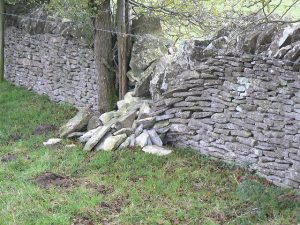Proverbs 24:30-34: “I went by the field of the lazy man, And by the vineyard of the man devoid of understanding; And there it was, all overgrown with thorns; Its surface was covered with nettles; Its stone wall was broken down. When I saw it, I considered it well; I looked on it and received instruction: A little sleep, a little slumber, A little folding of the hands to rest; So shall your poverty come like a prowler, And your need like an armed man.”
I imagine Solomon riding his chariot, perhaps in entourage, and suddenly a vineyard catches his eye. He diverts his course, brings his horses to a halt next to the stone wall. He props one leg up on it and looks over the vineyard. Growing through the wall is a tall and healthy weed – thorns, thistles. Instead of lines of trestles with vines hung, there are vines growing on the ground. Some have been choked out of life, and are just dead branches, but here and there some vines survive. But without the trestles, the pruning, the protection, there is little or no fruit. As Solomon looks, he is being taught by the owner of this field. The sluggard of the field is instructing Solomon without saying a word. Solomon is no doubt thinking, “All this land, land which was purchased at a cost, land which could be bringing the owner the joy of its fruit, and money through the sale of it, instead lies here, being used for no other purpose. Sheer laziness, sheer slothfulness has brought about this state of affairs, and instead of
fruitfulness, we have a sad and tragic waste.”

I wonder if it is too much to say that this scene might picture the lives of many pastors. Like the field, they have been purchased at a great price. Like the field, they have been seeded – not with grape-seed, but with gifts – spiritual abilities to teach, lead, help, administer, exhort. But instead of great fruitfulness, their lives are characterised by the thorns of poor family relationships, spiritual dryness in their own lives, spiritual apathy at church, a narrowing effectiveness with the lost, and an overall sense of ineffectiveness. Instead of fruit, there are thorns. But the reason is the same: instead of the discipline of a farmer, the evil of slothfulness has entered in. The farm illustration is certainly valuable. A field does not organise itself. If you neglect it, it will revert to chaotic, wild and random growth. Creation tends to go from order to disorder, unless you intervene and impose order upon it.
The human heart is the same. Left to itself, it does not organise itself into goals, plans, schedules, tasks and accountability. Left to itself, it pulls the blankets over its head, sleeps longer, watches more TV, surfs the web aimlessly, putters away its time. The truth is, without spiritual disciplines, a pastor can be like the field Solomon saw – full of potential, but lying in effective ruin, useless to God and man until the hardship of discipline is applied. A.W. Tozer spoke about the great temptation to laziness in the ministry: “It is easy for the minister to be turned into a privileged idler, a social parasite with an open palm and an expectant look. He has no boss within sight; he is not often required to keep regular hours, so he can work out a comfortable pattern of life that permits him to loaf, putter, play, doze and run about at his pleasure. And many do just that. The ministry affords limitless opportunity for the lazy man to indulge his talents. Doing nothing can be accomplished more gracefully in the Lord’s work than anywhere else, for the simple reason that the minister has no one to check up on him. The average church requires little of its pastor except to mark time decorously; the preacher with a propensity for loafing is strongly tempted to do just that. “However much we may dislike to hear it, loafing and puttering are deadly habits for the young minister. Hewill either conquer them or they will break him” (Tozer – A Word In Season).
A pastor without discipline will soon show the signs of his neglect. His barren prayer life will show up in his powerless preaching and ineffective witness. His lack of meditation will show up in his irritable spirit, and joyless attitude. His lack of illumination will show up in his counselling and decision-making which lack wisdom. His lack of sermon preparation and further reading will show up in his messages being repetitive, clichéd, and shallow. His lack of family time will show up in the increasing distance between him and his family. His lack of pastoral oversight will show up in the multiplying problems and discontent in his church. In short, his personal life, family and local church will start to look like that field.
Discipline for the pastor is like furrows and trestles to the vineyard farmer. Making a furrow in the soil won’t get you grapes, but you won’t get them without one. Building a trestle to tie the vines to won’t make you grapes, but you won’t get grapes without them. In the same way, spiritual disciplines will not give you spiritual fruit, but you won’t get fruit without it. Discipline is simply responding to the realities of the Fall. Our hearts tend to go from order to chaos, from diligence to sloth, from organisation to mess. In a world where the current pushes us downstream towards making a shipwreck of the faith, discipline is the hard row upstream. Discipline is imposing order upon disorder, opposing the bent of a depraved heart.

In fact, Paul made it clear that the reason he imposed discipline upon himself, was that without it, he feared he would be disqualified: 1 Corinthians 9:27 – “But I discipline my body and bring it into subjection, lest, when I have preached to others, I myself should become disqualified.” He believed disqualification, failing to make the grade, was a real threat if he simply followed his whims, impulses and comforts. When speaking to the young pastor Timothy, Paul enlists the illustrations of three of the most disciplined professions: 2 Timothy 2:3-6 – “You therefore must endure hardship as a good soldier of Jesus Christ. No one engaged in warfare entangles himself with the affairs of this life, that he may please him who enlisted him as a soldier. And also if anyone competes in athletics, he is not crowned unless he competes according to the rules.”
The hard-working farmer must be first to partake of the crops. The farmer is known for his consistent discipline. The soldier is known for embracing rigorous military discipline. The athlete is known for undergoing rigid bodily discipline. You couldn’t make
the point more if you wanted to. Pastors are not compared to playboy actors, to Internet stockbrokers or to part-time landscapers. They are compared to the people who day-in and day-out live by a rigid form of structure, organisation and self-denial so as to accomplish their goals. Put simply, discipline makes something else possible. Discipline by itself doesn’t do anything. Tying your shoelaces does not make you walk; it just stops you from tripping over them, or from slipping out of your shoes. Lifting the handbrake doesn’t make your car go; it just helps you to go without much hindrance.
Hebrews 12:1 – “Therefore we also, since we are surrounded by so great a cloud of witnesses, let us lay aside every weight, and the sin which so easily ensnares us, and let us run with endurance the race that is set before us.”
 – David De Bruyn, Professor of Church History, Shepherds’ Seminary Africa
– David De Bruyn, Professor of Church History, Shepherds’ Seminary Africa

